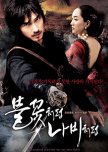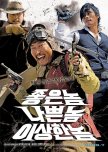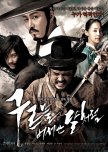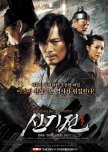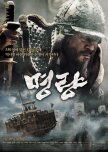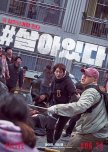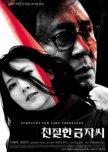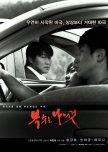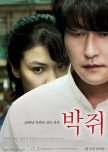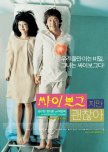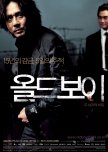
This review may contain spoilers
A HEARTBREAKING YET BEAUTIFULLY CRAFTED FILM
*Uprising* is a heartbreaking yet beautifully crafted film that takes us on an emotional journey through the friendship of Jong-Ryeo and Cheon-Yeong, set in a time of brutal class divisions in historical Korea. The plot centers on how the rigid social hierarchy affects their lives, particularly Cheon-Yeong, a slave who is forced to endure countless hardships in place of Jong-Ryeo.What starts as a cruel situation—Cheon-Yeong being beaten in Jong-Ryeo’s stead—evolves into a deep bond. Despite the fact that Cheon-Yeong isn’t born a slave, his family’s downfall forces him into this role, and it's his strength and refusal to accept the established hierarchy that makes him stand out. When he begins secretly teaching Jong-Ryeo how to fight, the dynamics between the two change, leading to a friendship that feels genuine despite the social disparity.
However, the film doesn’t shy away from the harsh realities of their world. Even after helping Jong-Ryeo win a prestigious sword-fighting competition, Cheon-Yeong is denied his freedom by Jong-Ryeo’s father, who breaks the promise of releasing him from slavery. This betrayal deeply scars Cheon-Yeong, though Jong-Ryeo still tries to protect him by sending him off to fight the Japanese invaders, hoping this will finally earn him his freedom. The film is filled with these moments of hope and crushing disappointment.
After years of fighting, Cheon-Yeong returns home only to find the world he left behind in ruins. Jong-Ryeo’s family home has been burned down by the people who suffered under the oppressive rule of his father. In one of the film’s most gut-wrenching moments, Cheon-Yeong tries to save Jong-Ryeo’s wife and son from the flames, but she refuses his help out of pride, seeing him as a slave rather than a person who might save her life. Her death serves as a stark reminder of how deeply ingrained social prejudice was, even to the point of self-destruction.
The climax of *Uprising* sees a tragic reunion between Jong-Ryeo and Cheon-Yeong after seven years of separation. Jong-Ryeo, unaware of the full story, initially believes Cheon-Yeong is responsible for his wife and son's deaths. Their final confrontation is tense, but as the truth is revealed, the film shifts focus from their conflict to a bittersweet reconciliation. Just when they finally resolve their long-standing misunderstanding, Jong-Ryeo is mortally wounded in battle against the Japanese. Cheon-Yeong kills the Japanese leader, Genshin, in a satisfying act of revenge, but it’s too late to save Jong-Ryeo.
In Jong-Ryeo’s final moments, he asks Cheon-Yeong if they’re still friends, referencing an earlier lighthearted exchange from their youth. It’s a poignant moment that captures both the tragedy and beauty of their relationship. Despite everything that has happened, the film shows that love and loyalty can persist, even in death. This scene is devastating, but it offers closure, showing that their bond was real despite the cruel world they lived in.
On a larger scale, *Uprising* also critiques the corruption of the ruling class, embodied by King Seonjo, whose greed and cowardice lead to the suffering of the common people. His alliance with the Japanese and subsequent desertion of his own throne during the invasion sparks the uprising that defines the film. The subplot involving Seonjo and the infamous Japanese leader Genshin, known as the “nose-snatcher,” adds layers of historical context and brutality to the narrative. In a symbolic twist, Seonjo’s greed is punished when the treasure he’s promised turns out to be boxes of human body parts—noses, to be precise—reflecting the horrors of war and the consequences of his betrayal.
In the end, Cheon-Yeong and a few of his fellow survivors form a new community, symbolically named “Beom Dong,” meaning “A world together.” It’s a hopeful note to close the film on, but *Uprising* doesn’t let the audience forget the price paid for such unity. The film leaves you with a lingering sense that although there’s hope for change, the struggle against social inequality is far from over.
*Uprising* masterfully balances personal and political themes, offering a powerful meditation on friendship, loyalty, and the fight for justice. It’s a tearjerker that hits hard, especially as it reveals the lasting impact of societal divisions, even as it tries to inspire hope for a better future.
Was this review helpful to you?

The cream of the crop in cinematic swordsmanship
First screened as the opening film at Busan International Film Festival 2024, this has proven to be a worthy eye-opener, and what's even better than Netflix making it available to watch right away globally. For a movie about swordsmanship, it does have a rather fancy plot that has multiple layers of depth in its character design and geopolitical setting. It was fueled with thick story development in class ideology and royal politics to generate that really serious buildup for the tension before the final fight, that core motivation of the characters may seem a little imprudent at first but it works well and gives a brilliant resolution towards the end. The final fight featuring trio swordsman is seriously the cream of the crop in cinematic martial arts sequence, everything is meticulously measured with the highest precision from tactical details to camera works, the scale is just unbelievably stupendous as it will definitely make you grab on the edge of the seat unknowingly while screaming out of shock when watching.Was this review helpful to you?

"You think you can attain real power through ideas alone?"
Uprising explored the plight of slaves and peasants around 1589 during a tumultuous time in Joseon history. It was also action packed with revolts and a Japanese invasion. All while the king waxed on about the insignificance of his tax and work base.Cheon Yeong has been a slave due to a legal and moral loophole ever since he was a child. He has reluctantly served the underachieving young master, Yi Jong Ryeo. Through the years they became fast friends until a broken promise and a misunderstanding set them on divergent paths as the Japanese began marching across the country.
The first thing I had to do was age the two main characters upward. When a flashback was labeled “Twelve years ago,” all I could think was that the two young boys did not look 30 years old. This trope of brothers or sworn brothers turned mortal enemies due to a misunderstanding has been done many times before. Poor Cheon didn’t even know there was a problem for seven years. He had his hands full fighting the Japanese with a ragtag assortment of peasants and slaves abandoned by the nobility. Yi served the king who had fled during the crisis. No one really cared what happened to the little people who were often killed or left homeless. Even when the king learned of the small band’s heroic results, he was more interested in how he was going to get a strong enough workforce and money to build a more splendid palace. Apparently, nobility had nothing to do with nobleness and keeping one’s word or administering true justice.
While the story was nothing new, the fights were well choreographed and gruesomely realistic. Swords are sharp and used with great force which meant body parts tended to go flying. Cheon was very disarming with a sword. Though it was the corrupt officials who caused righteous people to lose their heads. The director might have taken a little too much delight in mangled bodies. Kang Dong Won gave a strong performance as the dangerous and shrewd slave, though Cheon naively believed the duplicitous nobility too many times. I didn’t find Yi Jong Ryeo a very sympathetic or interesting character nor very nuanced. I enjoyed Kim Shin Rok’s Beom Dong who had a better insight into the ways of the nobility and a lot of moxie. She also wielded a mean staff.
Uprising kept a good pace throughout though it ran a bit long for me. The historical backdrop was far too complex to wedge into 120 minutes which made it feel like the story fast-forwarded over numerous subplots. The tragic showdown between Cheon and Yi was inevitable but a letdown. Honestly, I was more invested in the confrontations between Cheon “The Blue Robed God” and the “Nose Snatcher” Japanese commander Genshin Kikkawa. The animosity and fighting respect between the two warriors was compelling and thrilling. Going into the movie and knowing slavery continued for 300 more years after the events portrayed here only led to the feeling of pathos for many of the lives sacrificed. Despite some of my reservations, Uprising was an entertaining film and worth trying if you enjoy this genre.
22 October 2024
Trigger warnings: Numerous decapitations and dismemberments-many, many body parts flung around
Was this review helpful to you?

beautiful
It's a very nice movie, you are not bored 1 second.What I like !
Production ! It's clearly a very good production, costumes, scenery, fight, it's not a low budget !
Casting : awesome, with veteran actors very convincing.
Story : interesting (historical based)
fight scenes : very realistic, you will see blood !
What I dislike :
OST : not interesting
The flashback at start are sometimes a little confusing
Was this review helpful to you?

The Triangle of Warfare
You know how some movies feature a love triangle, where three people are involved in a romantic drama that can only end with two? Here, we have something akin to a *fighting triangle*, interestingly set up to represent the three parties involved in the conflict: the imperial guards, the slaves, and the Japanese enemies in this historical period of Korean history.Korean movies usually succeed in conveying strong emotion, and this movie has all the elements of a great drama, spiced up with thrilling battle choreographies. But for some reason, I couldn't empathize with the characters emotionally— basically none of them. The story is great, the actors are very good, and the production is top-notch, but something was not in the right place for a perfect epic, so I couldn't fully enjoy the film. I definitely appreciated the scenery, with its beautiful and sometimes brutal shots, but where the film should have been strongest—in the emotional clashes between the protagonists—something was missing, and I can't fully explain what it is. One of the reasons could be the movie's pacing, which wasn't fluid and jumped from one thing to the next, making it seem like the director didn't focus enough on the central plot.
What I really liked, however, was the theme about Korean society and the relationship between the upper and lower castes. There are echoes of a message that we should all be equal, whether someone is an emperor or a slave, and we know that because of this very message, the Catholic faith in Korea was violently suppressed in the early 19th century.
Was this review helpful to you?

Need to watch
storyit was really amazing. well written and worthy of your time. it tells a. story of friendship, love , and selflessness and society status. you get look at how people with low born stays felt during the josean era
acting
they could have not chosen a better cast. each and every actor/ actress did their big one and brought the story to life. it almost felt to really. all the emotions they displayed where just fire
overall
this movie is one for the books the emotions your are going to feel throughout this movie are just insane. you will get to sympathize with the characters and their thought process and some times just hate on them but I tell just take your time and press play you will never be the same again
Was this review helpful to you?

Action and Swordplay
If you’re looking for a great action drama with a lot of realistic swordplay, then look no further. This drama had it all. There were even some “Kill Bill” moments, if that’s what you like. The story was captivating and the acting was top notch. It had English dubbing with Netflix quality but I found myself listening to it in original Korean and reading the subscripts. I like it that way. I feel more submersed in the story. Sadly it didn’t have any romance but I can forgive that small shortcoming because I loved the movie.Was this review helpful to you?

Not as engaging as I hoped but worth a look
Uprising is a film that promises much: action, swordsmanship, disaffected friendship and an overview of how persons of the lesser classes were treated. It did not paint King Seonjo in a good light (and rightly so)..What I found during watching this movie is how little it engaged me. I found myself going through the viewing motions. The story in its telling was nothing new. However, if you look at it from the point of view of a historical action film, it has some merit. For me though, I found I was suffering from action sameness.
Now to who I liked. Kim Shin Rok as Beom Dong was superb. I wish I could have moved with such animation at the same age. Her character was strong, loyal and displayed superb martial arts. The Blue Robed God should have treated her with a touch more respect.
The two friends: one is a noble, the other is a very talented slave but his closest friend. The story of how they started out together was solid. However, what led to their difference of opinion and final reconciliation was underdone. Their relationship was complex, A film sometimes doesn’t have enough time or space to show this as was the case here. The acting by both was solid.
The message of how Seonjo viewed his people and what happens as a result of the Japanese invasion is valid. Unlike other uprisings in other nations where there was chaos and war, the King managed to survive and carry on. Why this happened is something that needs more exploration elsewhere.
Overall, it’s worth a look and better than many other Netflix films.
For such a lavish production, I expected more.
Was this review helpful to you?

A bloody, vibrant adventure with lots of action
First of all, it was a beautiful movie. It was an exciting, adventurous, action-packed movie from beginning to end. I think the striking title was friendship. It started as friendship, but continued with backstabbing, misunderstandings, betrayal and fighting. Finally, they settled accounts. They also resolved the misunderstanding. But it was too late.What is essential here is the strict rules of the past. Freedom being in the hands of others and the pain this caused to humanity were revealed. It turned into a struggle for rights for people classified as noble, common and slave class. The kingdom is also in a separate place. No one thinks about their people. That's why the kingdom collapses. The people rebel. Freedoms are gained.
Of course, we couldn't see the gain, but maybe a sequel will be made.
The story was well thought out, but some things were skipped, the easy way was preferred, and simplified in order to fit into a movie. Also, there are very bloody scenes, the excessive exposure of organ severings is annoying for the audience. I don't know if it will be encouraging, but it may seem disgusting and oppressive to some people. I think it should be less and should be glossed over more simply, it shouldn't be shown too much. Other than that, the acting was good. I liked it. Especially Cha Seung Won, who played the king, was the most prominent in my opinion. He played it very well. I can even say that he added a role to his role. I liked it. Kang Don Won, Park Jeong Min, Kim Shin Rok, Jin Seon Kyu, Jun Sung Ill are the ones I like. I recommend it to those who like this kind of action. Watch it. It's very good.
Was this review helpful to you?
This review may contain spoilers
Good cinematography
I went into the movie without any expectations and without knowing much about it. I hadn’t even watched the trailer. All I knew was that it’s a Netflix movie from South Korea, and the cast is strong.While watching, I did skip through a few parts—some scenes felt a bit repetitive, and the fight sequences ran a bit long. As the story unfolded, I realized it was structured almost like chapters in a book, focusing on themes like war, revolt, chaos, and ultimately, uprising. That aspect was pretty cool.
That said, I have to admit that the story itself wasn’t particularly striking. It felt more like a series of events leading up to the uprising rather than a gripping narrative. Still, I understood the message of brotherhood, and Yi Jong Ryeo’s final words were beautiful and moving.
Overall, I wouldn’t say it was a bad movie, but it wasn’t exactly my cup of tea.
Was this review helpful to you?

Suis-je toujours ton ami ?
Les films de Netflix ne sont pas mes préférés (les dramas non plus, d'ailleurs), mais le casting m'a vendu du rêve. De même quant à l'idée de base qui pouvait être originale mêlant amitié, confrontation et invasion japonaise.Ce n'est pas un film que j'ai envie de revoir une seconde fois, c'est certain. Cependant, il m'a entraîné sur ses deux heures sans aucun problème. Les scènes de combat sont efficaces, menées par Gang Dong Woo, Park Jeong Mon et Jung Sung Il. J'attendais de voir ce trio s'affronter, épées en main, et c'est ce qui est arrivé dans des scènes dynamiques et sanglantes. Après tout, Gang Dong Woo et Jung Sung Il font partie de mes acteurs préférés, j'en attendais tout au spectacle. L'ensemble du casting est excellent - personnages principaux, secondaires et figurants.
En revanche, il est dommage de voir le film délaisser des idées plutôt intéressantes, notamment celles autour du roi Seonjo, qui m'a souvent donné l'impression d'être une autruche aux portes d'une folie subtile, presque inexistante. De plus, j'ai trouvé un manque de profondeurs quant aux dialogues qui sont là, mais ne vibrent pas.
En bref, si l'histoire n'atteint jamais son plus haut niveau, le film sait rester entraînant, sur fond d'invasion japonaise et de révolte du peuple. Le tout avec des scènes de combats pleine d'action, dont une scène finale superbe, malgré une fin en demi-teinte.
Was this review helpful to you?






